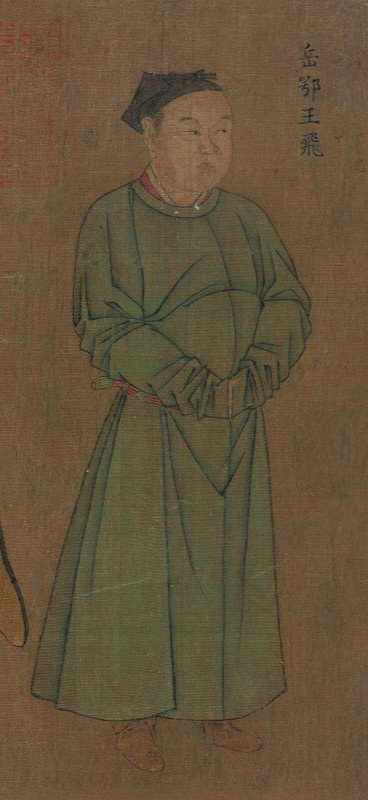
Yue Fei
Yue Fei (Chinese: 岳飛; March 24, 1103 – January 28, 1142),[1] courtesy name Pengju (鵬舉) was a Chinese military general who lived during the Southern Song dynasty and is remembered as a patriotic national hero of Song China, known for leading its forces in the wars in the 12th century between Southern Song and the Jurchen-ruled Jin dynasty in northern China. Because of his warlike stance, he was put to death by the Southern Song government in 1142 under a frameup, after a negotiated peace was achieved with the Jurchens.[2] Yue Fei is depicted in the Wu Shuang Pu (Chinese: 無雙譜; lit. 'Table of Peerless Heroes') by Jin Guliang.
For the ship, see ROCS Yueh Fei.Yue Fei's ancestral home was in Xiaoti, Yonghe Village, Tangyin, Xiangzhou, Henan (in present-day Tangyin County, Anyang, Henan). He was granted the posthumous name Wumu (武穆) by Emperor Xiaozong in 1169, and later granted the noble title King of È (鄂王) posthumously by the Emperor Ningzong in 1211. Since his death and after the fall of the Song dynasty in 1279, Yue Fei is widely seen as a culture hero in China; he has evolved into a paragon of loyalty in Chinese culture.
Biographies[edit]
Biography of Yue Fei[edit]
A biography of Yue Fei, the Eguo Jintuo Zubian (鄂國金佗稡編), was written 60 years after his death by his grandson, the poet and historian Yue Ke (岳柯) (1183–post 1240).[3][4][5] In 1346 it was incorporated into the History of Song, a 496-chapter record of historical events and biographies of noted Song dynasty individuals, compiled by Yuan dynasty prime minister Toqto'a and others.[6] Yue Fei's biography is found in the 365th chapter of the book and is numbered biography 124.[7] Some later historians including Deng Guangming (1907–1998) now doubt the veracity of many of Yue Ke's claims about his grandfather.[8]
According to the History of Song, Yue Fei was named "Fei", meaning to fly, because at the time he was born, "a large bird like a swan landed on the roof of his house".[9]
Descendants[edit]
Among Yue Fei's descendants was Yue Shenglong (岳昇龍) and his son the Qing dynasty official Yue Zhongqi,[83] who served as Minister of Defence and Governor-General of Shaanxi and Gansu provinces during the reign of the Yongzheng Emperor. Yue Zhongqi conquered Tibet for the Qing during the Dzungar–Qing War and attacked the Dzungars at Ürümqi in Xinjiang.[84][85] The Oirats were battled against by Yue Zhongqi.[86] Yue Zhongqi lived at the Ji Xiaolan Residence.
Another notable descendant of Yue Fei was Yue Yiqin, a flying ace of the Republic of China during the Second Sino-Japanese War.[87]
In 2011, two Yue descendants, Yue Jun and Yue Haijun, with six members of their clan, protested Jiangning Imperial Silk Manufacturing Museum's Qin Hui statue, which indicates that even after centuries, the Yue family still hates Qin Hui and his conspirators for their ancestor's plight. It has been reported that male members of the Yue family were not allowed to marry anyone whose surname was Qin until 1949, and genealogical records attest that this rule was rarely broken prior to its nullification.[88] In 2017, it was reported that were 1.81 million descendants of Yue Fei in China, and the number of Yue Fei's descendants in Anhui alone has grown to more than 1,003,000.[89]


